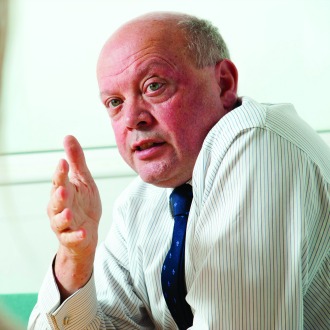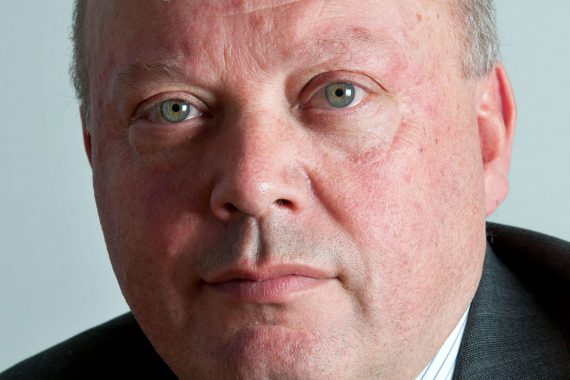
chief inspector Steve Field – online
Source: C. Milligan
You say 90% of practices are ‘good’ or ‘outstanding’. In that case, is there a need for the CQC – are practices already good enough?
That’s a very good question, as an ex-chair of the RCGP I’ve been saying for years that general practice is the jewel in the NHS crown. But there’s never been a comprehensive review of quality across England and we’ve done that now.
I’m absolutely delighted to be able to give a good news story and say ‘the vast majority of practices are providing good or outstanding care’. You’ve got all the figures, it’s nearly 90% are good.
This is the first kind of review in this country and we believe in any country across the world. I think we can say that, having shown the vast majority of care is good or outstanding, general practice is the best performing sector.
We support the Five Year Forward View, and we believe that it’s important that the funding that has been promised in the Forward View is delivered so that we can build on strong general practice.
Because clearly we know, from research in the past, that if you have a strong general practice the outcomes, even in hospitals, are better.
In the report, we mention the Bevan House practice in Bradford. They’ve worked with the economics department with York University, and they can prove … that for every pound invested in services they can save £1.50 to £8 on homeless care.
You’ve said the funding from the GP Forward View needs to be delivered if you’re going to improve on the 90% figure instead of resting on your laurels. How is the CQC going to advocate on practices behalf and fight practices’ – and patients’ – corner to ensure this money is getting through? Is it getting through quick enough now?
Obviously this paper is really important because it sends a very strong message out there to patients, but also to the NHS general practice is performing well. It’s worth investing in.
We’re highlighting the characteristics of good and outstanding practices, so that those which aren’t up to the same level can improve.
We’re demonstrating that the majority of practices have improved on second inspection.
You say that general practice has been under invested in. So, does the Government share some responsibility for the 10% of practices that aren’t good or outstanding?
I don’t think we can draw strong correlations with the funding of practices and whether they’re outstanding or they’re inadequate.
The characteristics of outstanding practices are around leadership and their interaction with other groups. What you find with a number of outstanding practices is that they seek additional funding because the leadership is so good.
The problem with inadequate practices is largely about lack of leadership, lack of vision. The main thing I would put my finger on is professional isolation.
I’m not saying practices need to merge and become bigger, but what I am saying is, we find characteristics of outstanding practices in small practices, and larger groups… they work together
So underinvestment is not something that undermines it, at all?
I don’t think we can draw that conclusion out of it. What we can say in a positive way is that investment from the GP Forward View is really important. It must deliver.
Does the CQC have any role in speaking up for patient care, and GP care, and ensuring that money gets there?
This is what I do and say whenever I’m talking. But it doesn’t get reported.
Ok, but how? What can we tell practices about how the CQC is going to be fighting their corner? Tell us that.
Well, by doing this review, by publishing the review, by speaking to people like yourself, by speaking at presentations and at speeches.
I met with the secretary of state [for health, Jeremy Hunt] yesterday and gave him, physically, a copy of this report yesterday and said ‘it’s a good news story for general practice’.
So I have been promoting the fact that the vast majority of practices are good or outstanding and people are pleased with that, it’s very good.
We point out practices have got out of date medicines in fridges and when we go back and they haven’t. So patients are in a safer situation.
Your report found that a number of practices had improved its ratings on the ‘patient safety’ domain. How is the CQC measuring an improvement in patient safety beyond just its rating systems?
Well, one of the things you probably know if that the reporting of serious incidents in general practice isn’t as comprehensive as it is in hospitals, so it’s very difficult to prove what we can show.
I think our inspection programme is probably much better than that improvement because once everybody was aware of the standards we expected, even before we go into inspect practices have geared up and therefore improved.
We can’t prove that they were bad before because when we go in they’re good.
But what we’ve done and what we’re continuing to do is develop our ratings and the key lines of enquiry with the profession. The BMA and the College have all been involved along with other groups but also with patients.
So this is an authoritative voice which shows that, even in those practices where we have had concerns, they are improving. We are absolutely delighted for patients.
But the problem with any system of monitoring is how do you monitor patient outcomes, particularly in clinical practice because in general practice you don’t often get an outcome for years.
So maybe a decade’s time we might see this improvement?
No I think we’re seeing issues now. We’re going into practices, for example, where they’ve got out of date medicines in fridges. We go back and they haven’t. So patients are in a safer situation.
We are finding that practices are doing better checks on recruitment now than they were before.
These are all proxy checks but now we’ve got the baseline we can move on. We are moving into an era where monitoring will become much more important [and] relationship management between the inspector and a group of practices.
We know that if it’s an ‘inadequate’ practice we re-inspect after six months, we know that we won’t need to inspect ‘good’ and ‘outstanding’ practices as frequently because we will be able to monitor on the data.
Our model will evolve over the next few years.
It mentions in the report that lack of workforce stifles improvement. You recognise in the report that when you’ve had an ‘inadequate’ or ‘requires improvement’ rating, that makes it harder to improve. Is that something the CQC will address?
We understand the workforce issues. As a GP I’ve worked in the inner city for years, we go around the surgeries and we see some of those issues.
But we’ve also seen creativity in workforce, where we’ve got a lot of strong nurse leadership like in Cuckoo Lane, Ealing.
And I was in an ‘outstanding’ practice two weeks ago where they said that since they were rated outstanding they’ve had no problems recruiting doctors to work, unlike doctors around them. But they’ve also had no problems recruiting administrative staff as well. And when I interviewed staff, because I went in to look at the characteristics of why they’re outstanding, they have fantastic manager leadership and clinical leadership. And when I spoke to staff, they went there in preference to other roles because it was rated outstanding.
The issue for ‘inadequate’ practices is largely about professional isolation and leadership. Many of those are now merging with other surgeries, or developing different ways of delivering, but we have set the standard with the College and BMA’s support, and patients particularly.
And now, we’re really, really chuffed.
This is a fantastic report for practices and those who haven’t come up to the line are improving, that’s good for patients, it’s good for general practice and it gives us a really good point to say ‘invest in general practice and we can move forward’.
Pulse October survey
Take our July 2025 survey to potentially win £1.000 worth of tokens















